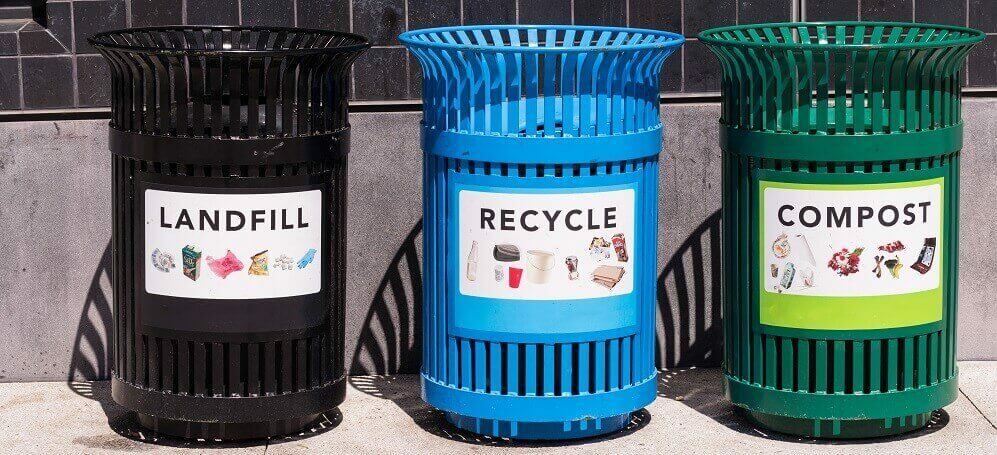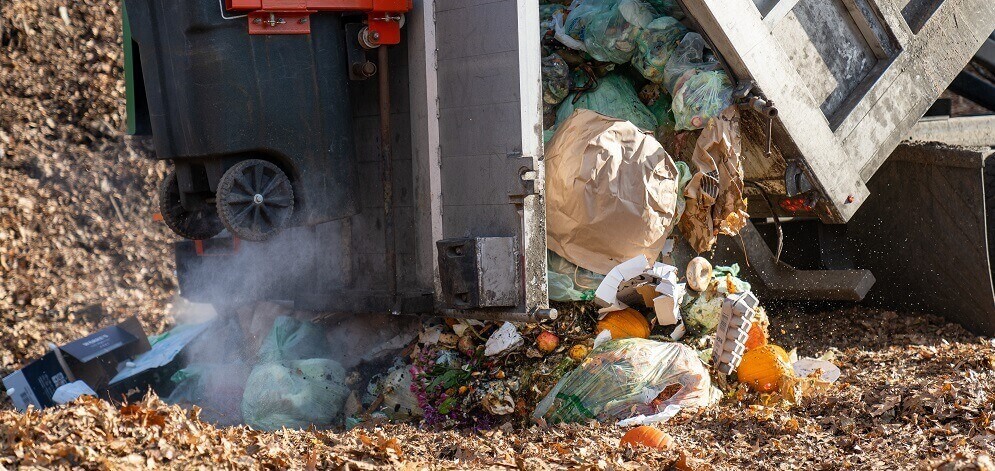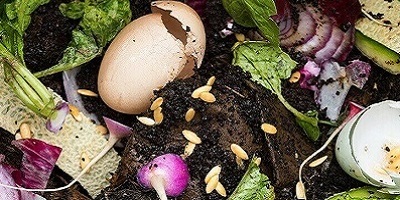In this article, we'll cover:
- What happens to food thrown in the trash?
- What types of composting exist?
- What are the environmental benefits of composting?
What happens to food thrown in the trash?
In 2018, the EPA estimated that 35.3 million tons of uneaten food went to landfills in the United States. This represents 24% of the total volume of municipal solid waste currently going into landfills. But, throwing organic matter into the garbage is not an efficient way to dispose of it.
When we throw food into the trash, we typically first wrap it in plastic garbage bags. When it reaches the landfill, these bags are combined with more trash then packed down to create space for additional waste. This entombment prevents the organic material from getting access to the sunlight, oxygen, and microbes needed to effectively break it down. Instead, these materials rot over time releasing greenhouse gases into the atmosphere that contribute to climate change.

Trash can be burned instead of landfilled but the environmental impact is not much better. In 2018 alone, the EPA estimated that 34.6 million tons of trash was incinerated. This process leaves toxic ash in its wake while releasing harmful carbon dioxide into the air.
A growing number of cities and states including Seattle and Vermont, have passed legislation mandating composting versus landfilling or burning organic materials. This movement is leading consumers and businesses to be more aware about how they are disposing of food, as well as to demand more sustainable products including compostable food packaging.
What Types of Composting Exist?
Backyard composting is the most widespread type of composting available. In a basic setup, consumers discard food scraps and yard waste into an outdoor pile or bin. To allow the organic material to break down properly, it’s recommended to maintain a 2:1 ratio of carbon (brown materials) to nitrogen (greens). It’s also important to break up large pieces, keep the pile moist, and turn it often. If you live in an urban setting, vermicomposting and countertop electric composters are other great options.
Commercial composting incorporates the same practices but on a much larger scale. These facilities can be private businesses or municipally-operated and perform curbside pickup. Dedicated commercial composting facilities use specialized equipment to build and process huge volumes of bio-based material. The resulting composted soil is commonly used for resale and in gardens and landscaping centers.
Because their volumes are so large, the temperatures within these piles can exceed 140 degrees Fahrenheit. This increased heat can allow for additional bio-based materials like bones, grease, dairy products, and compostable food packaging to be composted instead of being landfilled.
Learn more about the differences between home composting and industrial composting including what materials you can compost with either method. To locate a composter near you, visit our interactive map.

What Are the Environmental Benefits of Composting?
Besides creating an ideal soil for gardening, there are a variety of environmental, ecological, and economic benefits of composting.
Reduces Chemical Fertilizers & Recycles Nutrients
While inorganic commercial chemical fertilizers help promote immediate plant growth, they also do untold long-term damage. Excess nitrogen levels in the soil can contaminate groundwater, kill fish, and feed algae blooms. Nitrogen fertilizers, in particular, can create acidic soil PH which can reduce micro-organisms needed for healthy soil biology.
By composting, you are contributing to soil production and fertility, and reducing the need for chemical fertilizers. With food scraps, in particular, the nutrients pulled from the ground to grow the food are recycled back into the soil ecology. This is a major part of the equation as these valuable nutrients are trapped or destroyed when food scraps are landfilled or incinerated.
Studies have also shown organic farming practices to yield more nutrient-dense foods.
Reduces Municipal Waste Expenses
Taking compostable materials out of the landfill system can also save your town or city on its waste expenses. Combined, food scraps and organic yard waste make up the majority of what we throw away. Having another method to process this organic material saves on the expense of disposal. Some waste disposal companies even charge less if food waste is sent to a compost facility.
Combined, food scraps and organic yard waste make up the majority of what we throw away.
Reduces Greenhouse Gases
Extra carbon dioxide in the air adds to the greenhouse effect, which contributes to climate change. When compost is added to the soil, it helps extract excess CO2 from the air and traps it under the soil. Subsequently, plants use this CO2 to create carbohydrates that maintain the structure and health of the soil.
Conversely, food sent to a landfill does not receive the oxygen or water it needs to breakdown naturally. Instead, the organic materials slowly decompose over time producing greenhouse gases (methane and carbon dioxide) which are released into the atmosphere.
Improves Local Water Sources
The importance of composting for local water supplies cannot be understated. Compost can hold much more water than regular soil. Thus, composting can help water penetrate deeper into the ground versus running off. In fact, compost can improve soil's water-holding capacity by up to 20%.
Not only does this help plants grow and improve soils, but it also helps replenish local water sources like lakes and reservoirs. This, in turn, reduces water waste and even ensures that water undergoes better filtration before reaching the surface.
Reduces Landfill Dependence
As of 2018, the U.S. had more than 2,600 landfills in existence. With Americans producing more trash every year, additional landfill space will be required. Composting reduces the trash you produce while lessening our collective reliance on landfills allowing that land to be used for homes, recreation and more.
It's clear that composting is an important part of the waste stream. Composting reduces methane emissions from landfills, improves soil heath, recycles nutrients, and more. Get started with your own backyard compost pile or find a compost service near you.



